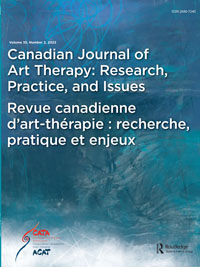Experiential Distance Learning? Reflection on the Potential Impact of the COVID-19 Pandemic on the Sense of Self-Efficacy of Art Therapy Students
The health context surrounding the COVID-19 pandemic has led to significant individual and social upheaval, which has also affected traditional teaching methods. Art therapy training was not spared, notably at the Université du Québec en Abitibi-Témiscamingue (UQAT). UQAT adopts an experiential teaching approach that engages students in a process that promotes the optimal acquisition of the skills inherent to the ethical exercise of the profession, allowing them to take the position of art therapist, in contact with their peers, while emotionally integrating the learning achieved. As the pandemic context forced a rapid shift to distance learning, the authors wanted to put into perspective the potential effects of virtual art therapy teaching on the development of female art therapy students’ sense of self-efficacy (SSE). To do this, they base their reflection on the results of surveys conducted among students and graduates as part of the evaluation of the master’s program in art therapy. Since experiential distance learning implies limitations in terms of emotional experience and actual contact with peers, it is justified to question the effects that these changes will have on trainees’ SSE.

